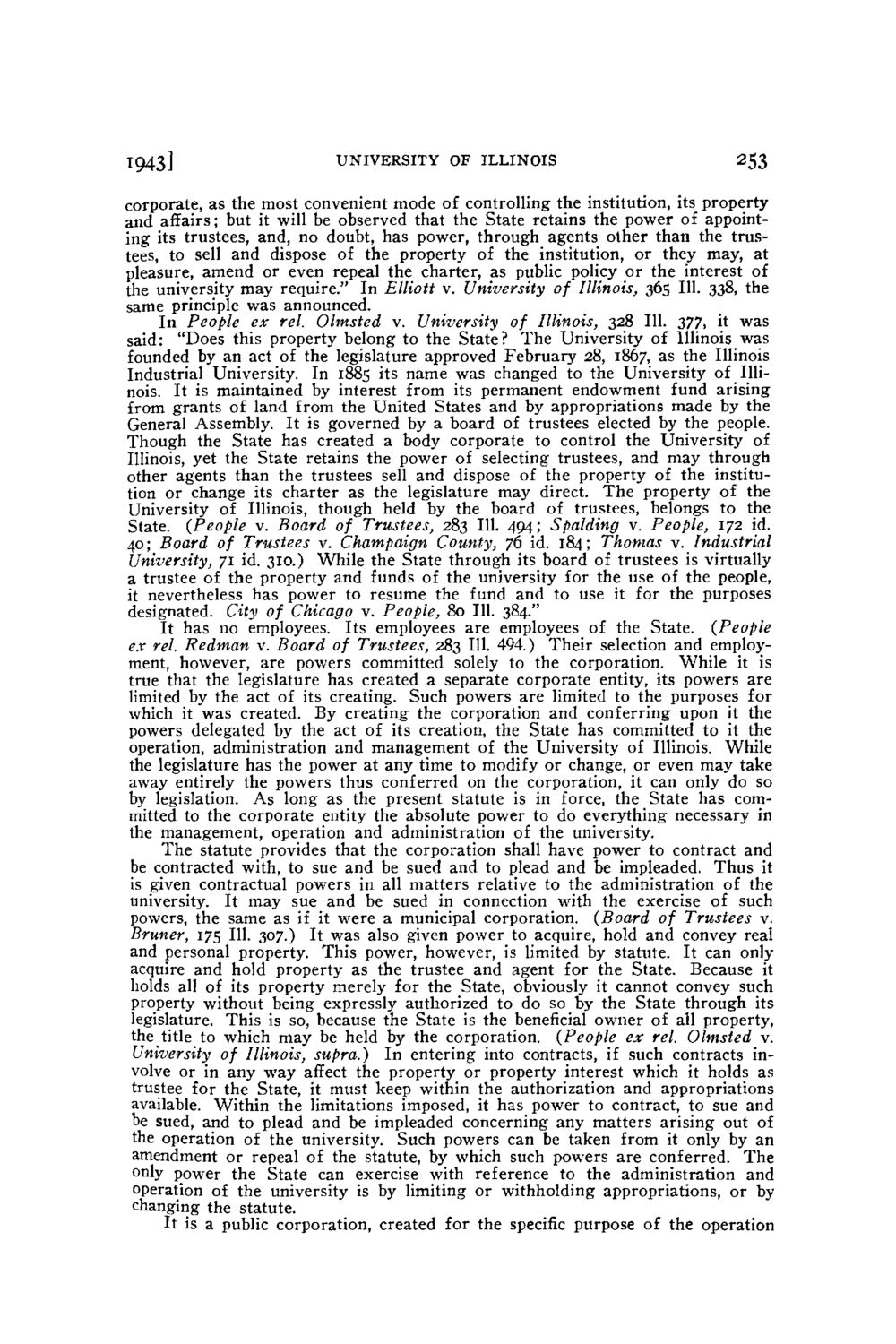| |
| |
Caption: Board of Trustees Minutes - 1944
This is a reduced-resolution page image for fast online browsing.

EXTRACTED TEXT FROM PAGE:
1943] UNIVERSITY OF ILLINOIS 253 corporate, as the most convenient mode of controlling the institution, its property and affairs; but it will be observed that the State retains the power of appointing its trustees, and, no doubt, has power, through agents other than the trustees, to sell and dispose of the property of the institution, or they may, at pleasure, amend or even repeal the charter, as public policy or the interest of the university may require." In Elliott v. University of Illinois, 365 111. 338, the same principle was announced. In People ex rel. Olmsted v. University of Illinois, 328 111. 377, it was said: "Does this property belong to the State? The University of Illinois was founded by an act of the legislature approved February 28, 1867, as the Illinois Industrial University. In 1885 its name was changed to the University of Illinois. It is maintained by interest from its permanent endowment fund arising from grants of land from the United States and by appropriations made by the General Assembly. It is governed by a board of trustees elected by the people. Though the State has created a body corporate to control the University of Illinois, yet the State retains the power of selecting trustees, and may through other agents than the trustees sell and dispose of the property of the institution or change its charter as the legislature may direct. T h e property of the University of Illinois, though held by the board of trustees, belongs to the State. {People v. Board of Trustees, 283 111. 494; Spalding v. People, 172 id. 40; Board of Trustees v. Champaign County, 76 id. 184; Thomas v. Industrial University, 71 id. 310.) While the State through its board of trustees is virtually a trustee of the property and funds of the university for the use of the people, it nevertheless has power to resume the fund and to use it for the purposes designated. City of Chicago v. People, 80 111. 384." It has no employees. Its employees are employees of the State. {People ex rel. Redman v. Board of Trustees, 283 111. 494.) Their selection and employment, however, are powers committed solely to the corporation. While it is true that the legislature has created a separate corporate entity, its powers are limited by the act of its creating. Such powers are limited to the purposes for which it was created. By creating the corporation and conferring upon it the powers delegated by the act of its creation, the State has committed to it the operation, administration and management of the University of Illinois. While the legislature has the power at any time to modify or change, or even may take away entirely the powers thus conferred on the corporation, it can only do so by legislation. As long as the present statute is in force, the State has committed to the corporate entity the absolute power to do everything necessary in the management, operation and administration of the university. The statute provides that the corporation shall have power to contract and be contracted with, to sue and be sued and to plead and be impleaded. Thus it is given contractual powers in all matters relative to the administration of the university. It may sue and be sued in connection with the exercise of such powers, the same as if it were a municipal corporation. {Board of Trustees v. Bruner, 175 111. 307.) It was also given power to acquire, hold and convey real and personal property. This power, however, is limited by statute. It can only acquire and hold property as the trustee and agent for the State. Because it holds all of its property merely for the State, obviously it cannot convey such property without being expressly authorized to do so by the State through its legislature. This is so, because the State is the beneficial owner of all property, the title to which may be held by the corporation. (People ex rel. Olmsted v. University of Illinois, supra.) In entering into contracts, if such contracts involve or in any way affect the property or property interest which it holds as trustee for the State, it must keep within the authorization and appropriations available. Within the limitations imposed, it has power to contract, to sue and be sued, and to plead and be impleaded concerning any matters arising out of the operation of the university. Such powers can be taken from it only by an amendment or repeal of the statute, by which such powers are conferred. The only power the State can exercise with reference to the administration and operation of the university is by limiting or withholding appropriations, or by changing the statute. It is a public corporation, created for the specific purpose of the operation
| |